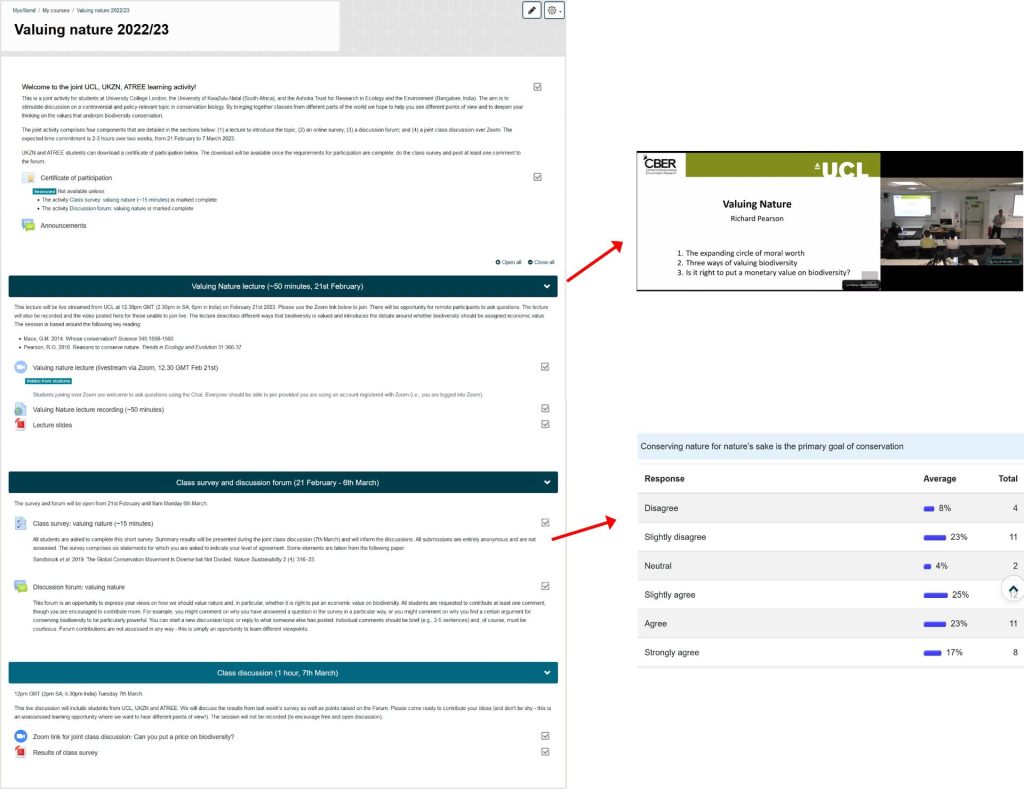Richard Pearson1, Cathy Sutherland2, George Lekeas3, Mvuselelo Ngcoya2, Andre Vosloo4, Sidd Krishnan5, Saloni Bhatia5, Rob Slotow1,4
1 Division of Biosciences, UCL, UK, 2 School of Built Environment and Development Studies, University of KwaZulu-Natal, South Africa, 3 Digital Education Team, UCL, UK, 4 School of Life Sciences, University of KwaZulu-Natal, South Africa, 5 Ashoka Trust for Research in Ecology and the Environment, India.
Online learning environments provide an opportunity to enrich student learning by linking classrooms around the world for joint activities. Here we describe a collaborative learning experience between higher education institutions in the UK, South Africa and India in which students at each institution participate in a joint virtual classroom. The learning objectives are to stimulate discussion and to help students see different points of view, including from other parts of the world.
Learning can be enriched by exposing students to a diversity of perspectives. For example, in teaching conservation biology we tackle difficult questions around how nature should be valued, with answers depending on an individual’s worldview. Moreover, like other areas of academic study, conservation is a field with a Global North knowledge bias that needs confronting. We therefore built a collaboration among teachers leading undergraduate and masters courses across three continents.
We use UCL Extend, UCL’s external-facing online education platform, to create a shared learning space for students enrolled on several courses: 1. the UCL module Species conservation and biodiversity (available to BSc, MSci, and MSc students); 2. several Honours and Masters courses in nature conservation and environmental planning at the University of KwaZulu-Natal (UKZN) South Africa; and 3. the MSc in Conservation Practice at the Ashoka Trust for Research in Ecology and the Environment (ATREE), India. UCL students are directed to UCL Extend from their module’s Moodle page, and students at UKZN and ATREE are provided with instructions to register and join.
The joint activities comprise the following four elements, undertaken over a 2-week period with an expected time commitment from each student of 2-3 hours:
- Lecture: Richard Pearson presents a lecture at UCL introducing the topic and main points for discussion. The Lecturecast recording is made available to external students via Mediacentral (here).
- Class survey: Students complete a short Moodle questionnaire designed to solicit views on contentious topics. The survey comprises six statements for which students are asked to indicate their level of agreement.
- Discussion forum: Students contribute to a Moodle forum, which offers an opportunity to express their views and respond to other people’s comments. All students are requested to contribute at least one comment over the two week period.
- Joint class discussion: We hold a synchronous discussion session over Zoom for 1.5 hours. The session begins with a short overview of the survey results and key themes from the forum, then is open for discussion among all participants. The session is co-chaired by staff from the different institutions, who encourage a diversity of contributions. This session is not recorded to encourage free and open discussion.

There is no formal assessment as part of the joint activities but we offer a Certificate of Participation for those who meet basic requirements (they must complete the survey and make at least one contribution to the forum). Participation has been good, with almost 50 students completing the survey and joining the Zoom discussion session in 2022. The level of discussion is consistently excellent, with diverse perspectives brought to the table, some very good examples shared, and a highly collegiate and respectful tone maintained.
The approach has potential to be adopted in other programmes and we highlight the following general points:
- While many online learning activities aim to centralize teaching, notably with Massive Open Online Courses (MOOCs), the model we use is one of collaborative teaching across institutions. The bulk of learning remains within local groupings, meaning manageable class sizes and the overwhelming advantage of in-person teaching, yet with the benefit of being able to share materials and perspectives across continents.
- Although the joint activities do not create new funding streams (unlike MOOCs, which often charge a student fee), the initiative will enhance institutional reputation and has potential to draw in new students (e.g., undergraduate participants subsequently applying to do postgraduate study).
- For UCL, this kind of activity creates engagement with students from parts of the world that are currently underrepresented in the student body, thus adding new perspectives to teaching and helping to raise the institution’s profile as London’s Global University.